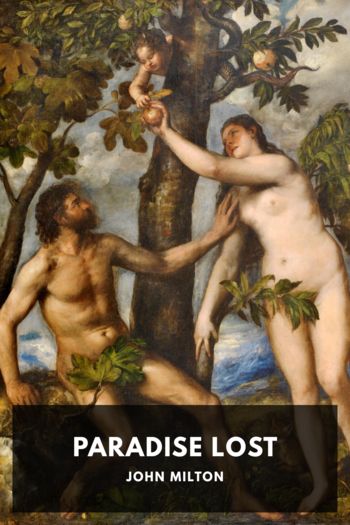Table-Talk by William Hazlitt (best pdf reader for ebooks txt) 📕

- Author: William Hazlitt
Book online «Table-Talk by William Hazlitt (best pdf reader for ebooks txt) 📕». Author William Hazlitt
Lord Holland had made a diary (in the manner of Boswell) of the conversation held at his house, and read it at the end of a week pro bono publico. Sir James Mackintosh made a considerable figure in it, and a celebrated poet none at all, merely answering Yes and No. With this result he was by no means satisfied, and talked incessantly from that day forward. At the end of the week he asked, with some anxiety and triumph, if his Lordship had continued his diary, expecting himself to shine in “the first row of the rubric.” To which his noble patron answered in the negative, with an intimation that it had not appeared to him worth while. Our poet was thus thrown again into the background, and Sir James remained master of the field! ↩
A Mr. Rose and the Rev. Dr. Kippis were for many years its principal support. Mrs. Rose (I have heard my father say) contributed the Monthly Catalogue. There is sometimes a certain tartness and the woman’s tongue in it. It is said of Gray’s “Elegy,” “This little poem, however humble its pretensions, is not without elegance or merit.” The characters of prophet and critic are not always united. ↩
There are some splendid exceptions to this censure. His comparison between Ovid and Virgil and his character of Shakespeare are masterpieces of their kind. ↩
We have critics in the present day (1821 —Ed.) who cannot tell what to make of the tragic writers of Queen Elizabeth’s age (except Shakespeare, who passes by prescriptive right), and are extremely puzzled to reduce the efforts of their “great and irregular” power to the standard of their own slight and showy commonplaces. The truth is, they had better give up the attempt to reconcile such contradictions as an artificial taste and natural genius; and repose on the admiration of verses which derive their odour from the scent of rose leaves inserted between the pages, and their polish from the smoothness of the paper on which they are printed. They, and such writers as Decker, and Webster, Beaumont and Fletcher, Ford and Marlowe, move in different orbits of the human intellect, and need never jostle. ↩
The intelligent reader will be pleased to understand that there is here a tacit allusion to Squire Western’s significant phrase of “Hanover Rats.” ↩
Of the two the latter alternative is more likely to happen. We abuse and imitate them. They laugh at, but do not imitate us. ↩
The title of “Ultra-Crepidarian critics” has been given to a variety of this species. ↩
This essay was written in January 1821. ↩
Losing gamesters thus become desperate, because the continued and violent irritation of the will against a run of ill luck drives it to extremity, and makes it bid defiance to common sense and every consideration of prudence or self-interest. ↩
Some of the poets in the beginning of the last century would often set out on a simile by observing, “So in Arabia have I seen a Phoenix!” I confess my illustrations are of a more homely and humble nature. ↩
I beg the reader to consider this passage merely as a specimen of the mock-heroic style, and as having nothing to do with any real facts or feelings. ↩
Pliny’s Natural History, Book 36. ↩
I have heard of such a thing as an author who makes it a rule never to admit a monosyllable into his vapid verse. Yet the charm and sweetness of Marlowe’s lines depended often on their being made up almost entirely of monosyllables. ↩
See Wilkie’s Blind Fiddler. ↩
Essay on Consciousness, p. 303. ↩
We sometimes see a whole playhouse in tears. But the audience at a theatre, though a public assembly, are not a public body. They are not Incorporated into a framework of exclusive, narrow-minded interests of their own. Each individual looks out of his own insignificance at a scene, ideal perhaps, and foreign to himself, but true to nature; friends, strangers, meet on the common ground of humanity, and the tears that spring from their breasts are those which “sacred pity has engendered.” They are a mixed multitude melted into sympathy by remote, imaginary events, not a combination cemented by petty views, and sordid, selfish prejudices. ↩
Mr. Munden and Mr. Claremont went one Sunday to Windsor to see the king. They passed with other spectators once or twice: at last, his late majesty distinguished Munden in the crowd and called him to him. After treating him with much cordial familiarity, the king said, “And, pray, who is that with you?” Munden, with many congees, and contortions of face, replied, “An please your majesty, it’s Mr. Claremont of the Theatre Royal Drury Lane.” “Oh! yes,” said the king, “I know him well—a bad actor, a bad actor, a bad actor!” Why kings should repeat what they say three times is odd: their saying it once is quite enough. I have always liked Mr. Claremont’s face since I heard this anecdote, and perhaps the telling it may have the same effect on other people. ↩
The trunk-maker, I grant, in the





Comments (0)